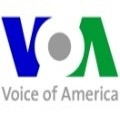Many of the questions focused on the growing concern over who will be leading Russia once President Putin's second term ends next year. Russia has not had a normal transfer of power by popular vote in its post-Soviet history. But President Putin told reporters the people's will would prevail in 2008. As he put it, there will be candidates, rather than a code, "chosen successor." President Putin said his only task is to ensure that the authorities provide free and fair elections so the vote will yield the Russian people's choice. The Kremlin is widely believed to be grooming two people as possible successors - First Deputy Prime Minister Dmitry Medvedev and Defense Minister Sergei Ivanov. But Mr. Putin did not endorse either man.
Among the most sensitive topics President Putin was asked to address was the high-profile murders of two strong Kremlin critics in 2006 - investigative journalist Anna Politkovskaya and fugitive former Russian agent Alexander Litvinenko.
Politkovskaya had been working on an expose about alleged Russian military abuses in Chechnya when she was gunned down outside her Moscow apartment. She is the 13th journalist believed to have been murdered for her work since Putin came to power.
The Russian president, who aroused the anger of human rights advocates by failing to comment promptly on Politkovskaya's death, said that persecution of journalists is one of Russia's most serious problems. Mr. Putin also promised to do everything in his power to defend the press. But he was not as conciliatory in his comments on Litvinenko, who blamed Putin for his radiation poisoning in a deathbed statement.
The president belittled the former agent's importance, saying he was a minor player with no access to state secrets. He also branded him a criminal and said he was fired from Russia's security services. But he rejected the views of some Russian officials who say that there is a conspiracy aimed at discrediting Russia's image abroad. Putin praised the stability of Russia's government, pointing in particular to the economic gains of the past year. He said the country's gross domestic product had grown by nearly seven percent and inflation had been brought below double digits. But he acknowledged his government's failure to close the gap between Russia's rich and poor. He said closing that is one of his remaining tasks

